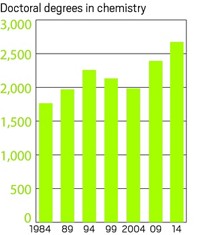Advertisement
Grab your lab coat. Let's get started
Welcome!
Welcome!
Create an account below to get 6 C&EN articles per month, receive newsletters and more - all free.
It seems this is your first time logging in online. Please enter the following information to continue.
As an ACS member you automatically get access to this site. All we need is few more details to create your reading experience.
Not you? Sign in with a different account.
Not you? Sign in with a different account.
ERROR 1
ERROR 1
ERROR 2
ERROR 2
ERROR 2
ERROR 2
ERROR 2
Password and Confirm password must match.
If you have an ACS member number, please enter it here so we can link this account to your membership. (optional)
ERROR 2
ACS values your privacy. By submitting your information, you are gaining access to C&EN and subscribing to our weekly newsletter. We use the information you provide to make your reading experience better, and we will never sell your data to third party members.
Careers
Report details time to doctorate
April 3, 2006
| A version of this story appeared in
Volume 84, Issue 14
Over the past 25 years, the total time from baccalaureate to earning a Ph.D. in the physical sciences has risen by almost a year to 7.9 years, according to an NSF report. "Time to Degree of U.S. Research Doctorate Recipients" pulls data from 1978 to 2003 from the agency's Survey of Earned Doctorates. Among physical science fields, chemistry has the shortest time to degree, with students taking an average of 6.9 years, followed by physics and astronomy, where the average time is 7.6 years, and mathematics, with an average time of 7.9 years. The report also notes that 66% of those earning a Ph.D. in all fields in 2003 received primary support from program- or institution-based sources, such as teaching assistantships, research assistantships, and fellowships. Of that group, those with teaching assistantships had the longest average time to degrees. The data also show that earning a master's degree lengthened the time to Ph.D. In chemistry, for instance, the average time to earn a degree for those who didn't receive a master's degree was six years, while those who did earn a master's took an average of 8.5 years.



Join the conversation
Contact the reporter
Submit a Letter to the Editor for publication
Engage with us on Twitter